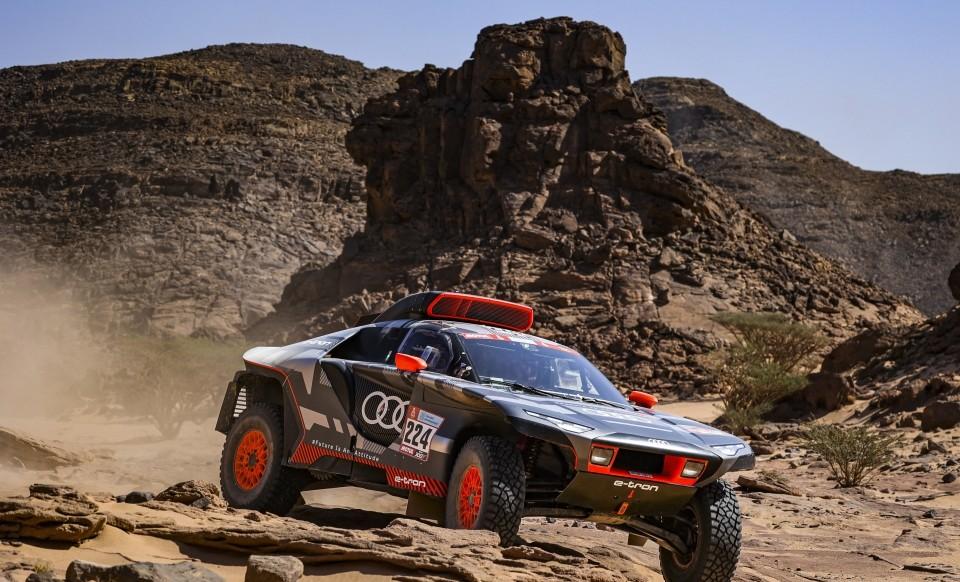In 2020, Audi announced its withdrawal from Formula E and announced that the next challenge would be the Dakar Rally. Many people do not understand why Audi, which has always given a clean and gentle image, suddenly challenged the Dakar Rally, known as the "Race of Hell".

[1] "Dakar Rally", the hell that Audi himself broke into
The Dakar Rally, held every January, is an extreme cross-country race that covers rough roads such as deserts, valleys and mountain roads for two weeks with a total mileage of more than 8,300 km (2022). The rules are simple. The fastest method is to run 10 or more stages, averaging 700 kilometers per day.
The biggest difference is that drivers have to open up uninhabited areas on their own without a fixed route. It is very different from road races on paved roads or tracks and general rally races on designated unpaved roads.
In the desert, where the temperature difference reaches 50 degrees per day, running on an unsafe road, the race completion rate is less than 50%, and more than 70 people have died in the Dakar Rally so far. For this reason, it is called the "Death Rally". Before the race starts, contestants must fill out a terrible oath that reads "If you die in the race, you will be held responsible".
The early Dakar Rally was from Paris, France to Dakar, the capital of Senegal, traversing North Africa such as the Sahara Desert. That's why it's called the "Dakar Rally". However, due to the threat of terrorism in African conflict countries, it was changed to South America from 2009 and held in Saudi Arabia from 2020. Even after that, the start and finish points changed little by little, but it is still called the "Dakar Rally".
[2] Audi focuses on formula E, why choose the Dakar Rally?
There are two main reasons why automakers spend a lot of money on motorsport. One is reputation, and the other is to make better cars based on data obtained in harsh environments. The biggest reason audi is participating in the Dakar Rally is to develop better electric vehicles than others in the era of electrification.
Until now, cars have been developed through motorsport. The same is true in the era of electrification. Audi participates in the electric vehicle competition "Formula E" and develops its own electric powertrain. With a solid record of seven years of one crown and three asian championships, he abruptly announced his withdrawal from Formula E in 2020, followed by the Dakar Rally as his next destination.
We don't know exactly what that means, but Audi seems to want to get data about electrified powertrains from harsher places. Until now, the range of mass-produced electric vehicles has tended to vary greatly due to external factors. And you're always stressed out for the remaining miles. In this case, if Audi's electric vehicle successfully crosses thousands of kilometers of desert, it will have the potential to significantly increase consumer confidence in electric vehicles.
[3] Audi's special electric rally car RS Q e-tron
Audi has left a unique mark on motorsport. While everyone was building back-drive cars, Audi built front-drive cars that overwhelmed rivals and even built the world's first car to exceed 400 km/h. Known as the "Crazy Race", WRC Group B led the global motorsport trend by creating a craze for the four-wheel drive system "quattro". Audi, which is equipped with a diesel engine and won the 24 Hours of Le Mans, is still a legend of the endurance race.
In this Dakar rally, Audi's quirks were exposed. It was the first ever rally car RS Q e-tron with an electric powertrain. Anyone interested in Audi can understand its composition at a glance just by looking at the name. The RS (Renn Sport) stands for Audi's ultra-high-performance lineup, the Q stands for SUV, and the e-tron stands for electric vehicles. In other words, it's a high-performance SUV with an electrified powertrain.
There are many more electric car races, but the reason why rally races cannot be introduced is because of the limitations of the battery. You have to run 800 kilometers in the desert, and with current technology it is impossible to continue running at such a high speed. The charging pressure is also very large.
Audi overcame this problem by installing an engine. It has the same approach as range-extended electric vehicles. The vehicle is powered by an electric motor and an electric vehicle-proven power generation system, and the 2.0-litre four-cylinder TFSI engine taken from DTM racing cars is used solely to charge the battery.
[4] Audi's ambitious challenge, how did the first game result?
The Dakar Rally celebrates its 44th anniversary this year. Since the beginning of the Lunar New Year, more than 300 teams and 1,060 athletes from 63 countries have competed in five categories, including passenger cars, trucks, motorcycles, quad bikes, and four-wheeled off-road vehicles (SSVs).
Matthias Ekstrom, Emile Bergvist, Stefan Peterhansel, Edouard Boulanger, Carlos Sains and Lucas Cruz
"Dakar rookie" Audi used a total of three RS Q e-trons. Each car has two people, the main driver and the co-pilot, and the driver lineup stands out. It is said that it will be difficult to see such a combination in the future.
So, what is the outcome of the 2022 Dakar Rally? The automotive division was won by Nasser Al Atiyah (Toyota Gazoo Racing). The Audi Sport team's Matthias Ekstrom finished ninth and Carlos Sains finished twelfth. Unfortunately, Stefan Peter Hansel suffered a major accident on Stage 2 and was only 57th due to navigation issues.
Audi did not win the championship, but Audi's influence was enormous. With 12 stages, Audi was judged to open up new possibilities for the Dakar Rally, a direct testament to the strong competitiveness of electric vehicles even in desert environments.